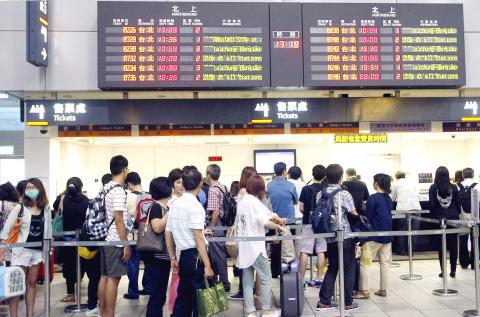The legislature’s Economic Committee yesterday passed a resolution demanding the Fair Trade Commission (FTC) investigate whether Taiwan High Speed Rail Corp (THSRC, 台灣高鐵) has abused its monopoly by hiking ticket prices.
Because the THSRC has replaced airlines and buses as the main means of middle and long-distance travel in the west of the nation, the resolution said the company enjoys a certain level of monopoly power.
As a result, the company’s price hikes of between 7.1 percent and 9.7 percent starting this month may have violated Article 10 of the Fair Trade Act (公平交易法), which prohibits monopolistic companies from improperly setting, maintaining or changing the price for goods or the remuneration for services, the resolution said.

Photo: CNA
“The company should not raise prices, since the government offered the company a 15 percent discount on electricity rates, which reduces the company’s expenditure by NT$200 million (US$6.8 million) a year,” Democratic Progressive Party (DPP) Legislator Lin Tai-hua (林岱樺) said at the committee meeting.
FTC Chairman Wu Shiow-Ming (吳秀明) agreed to investigate and submit a report to the committee by the end of the year.
Wu said the commission would first examine whether THSRC has monopoly power, by identifying the transportation market and its competitors.
“Some customers may choose to take the train instead of Taiwan High Speed Rail,” Wu said.
However, even if the company has a monopoly, it is still difficult to accuse it of setting improper prices since the prices were approved by the Ministry of Transportation and Communications, Wu said.
“The company might argue that it set its prices based on the Railway Act (鐵路法), which supersedes the Fair Trade Act,” FTC spokesman Sun Lih-chyun (孫立群) said by telephone.
Meanwhile, the legislature’s Finance Committee yesterday urged the nation’s eight state-run banks to withdraw their syndicated loans to THSRC or raise the interest rates, citing the company’s price hike.
Various Chinese Nationalist Party (KMT) and DPP lawmakers on the committee expressed strong dissatisfaction with THSRC’s decision to raise ticket prices and its large stock dividends.
The company still pays more than NT$3 billion in preferred stock dividends to the eight state-run banks, while enjoying interest rates of less than 2 percent on loans from these banks, legislators added.
Since the company has returned to the black since 2011, with profits expected to be boosted on the back of higher ticket prices, legislators asked the state-owned banks to consider raising interest rates to THSRC, or even withdraw syndicated loans to the company.
Regarding preferred stock dividends, Taiwan Financial Holding Co (台灣金控) chairwoman Lee Jih-chu (李紀珠) said state-run banks have filed a lawsuit against THSRC, with expectations of success after the China Technical Consultants Incorporated Foundation (財團法人中技社) won a similar lawsuit against the company.

Hong Kong authorities ramped up sales of the local dollar as the greenback’s slide threatened the foreign-exchange peg. The Hong Kong Monetary Authority (HKMA) sold a record HK$60.5 billion (US$7.8 billion) of the city’s currency, according to an alert sent on its Bloomberg page yesterday in Asia, after it tested the upper end of its trading band. That added to the HK$56.1 billion of sales versus the greenback since Friday. The rapid intervention signals efforts from the city’s authorities to limit the local currency’s moves within its HK$7.75 to HK$7.85 per US dollar trading band. Heavy sales of the local dollar by

To many, Tatu City on the outskirts of Nairobi looks like a success. The first city entirely built by a private company to be operational in east Africa, with about 25,000 people living and working there, it accounts for about two-thirds of all foreign investment in Kenya. Its low-tax status has attracted more than 100 businesses including Heineken, coffee brand Dormans, and the biggest call-center and cold-chain transport firms in the region. However, to some local politicians, Tatu City has looked more like a target for extortion. A parade of governors have demanded land worth millions of dollars in exchange

Taiwan Semiconductor Manufacturing Co’s (TSMC, 台積電) revenue jumped 48 percent last month, underscoring how electronics firms scrambled to acquire essential components before global tariffs took effect. The main chipmaker for Apple Inc and Nvidia Corp reported monthly sales of NT$349.6 billion (US$11.6 billion). That compares with the average analysts’ estimate for a 38 percent rise in second-quarter revenue. US President Donald Trump’s trade war is prompting economists to retool GDP forecasts worldwide, casting doubt over the outlook for everything from iPhone demand to computing and datacenter construction. However, TSMC — a barometer for global tech spending given its central role in the

The Financial Supervisory Commission (FSC) yesterday met with some of the nation’s largest insurance companies as a skyrocketing New Taiwan dollar piles pressure on their hundreds of billions of dollars in US bond investments. The commission has asked some life insurance firms, among the biggest Asian holders of US debt, to discuss how the rapidly strengthening NT dollar has impacted their operations, people familiar with the matter said. The meeting took place as the NT dollar jumped as much as 5 percent yesterday, its biggest intraday gain in more than three decades. The local currency surged as exporters rushed to